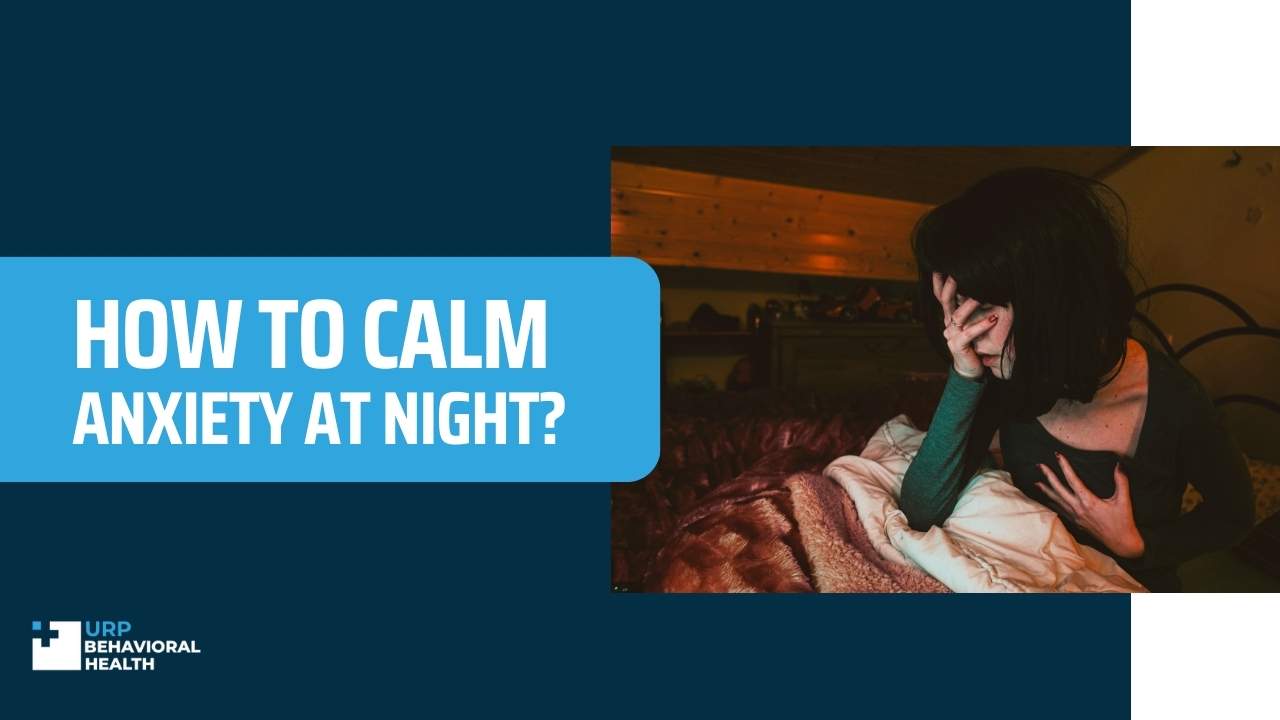
How to Calm Anxiety at Night?
Do you ever feel like you think about all your problems right before going to sleep? This can occur due to stress, an anxiety disorder, or any other medical condition. Anxiety is a condition that needs no introduction-– it’s the most common mental health concern in the US, with over 40 million adults diagnosed with one anxiety disorder or another.
Your anxiety can interfere with just about any aspect of your life – including your sleep. This not only makes it harder to fall asleep, but the following day becomes progressively more stressful. If you feel like your anxiety is getting in the way of a good night’s rest, here’s what you should know about why it occurs and how you can calm your anxiety at night.
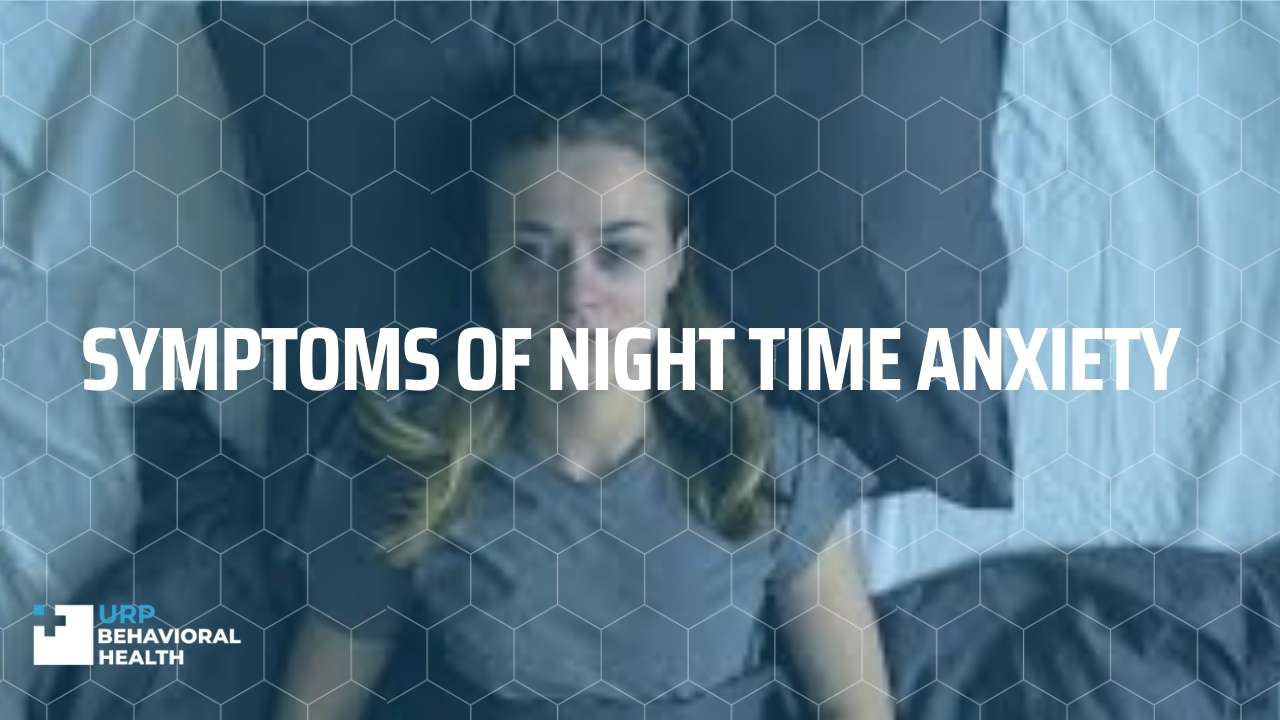
Symptoms of Night Time Anxiety
If you get bouts of anxiety out of the blue during bedtime, then you’re probably familiar with some of the following symptoms.
- Physical and physiological symptoms: When you have distressing thoughts while lying in bed, you may experience physical sensations like sweating, shallow breathing, and heart palpitations.
- Rumination: This means getting stuck in a cycle of worrying or distressing thoughts. Maybe you’ve gone through a traumatic event or are facing money problems. When you ruminate, you fixate on the issue by thinking about it over and over again, aggravating an existing anxiety disorder.
- Panic symptoms: When your anxiety levels increase at night, it’s possible that you may even experience a panic attack. This includes a range of physical symptoms like trembling, difficulty breathing, and numbness in the hands.
- Tense muscles: Anxiety and stress can cause your muscles to become tense and contract. This can contribute to headaches, jaw pain, and sore muscles.
Experiencing nightmares is another symptom (and cause) of nighttime anxiety. If you have nightmares often, it’s possible that you feel anxious about going to bed. Similarly, if you ruminate about distressing and traumatic events before bed, it’s likely that you’ll have nightmares. And when you do, it’s possible that you’ll wake up feeling stressed and unable to go back to sleep.
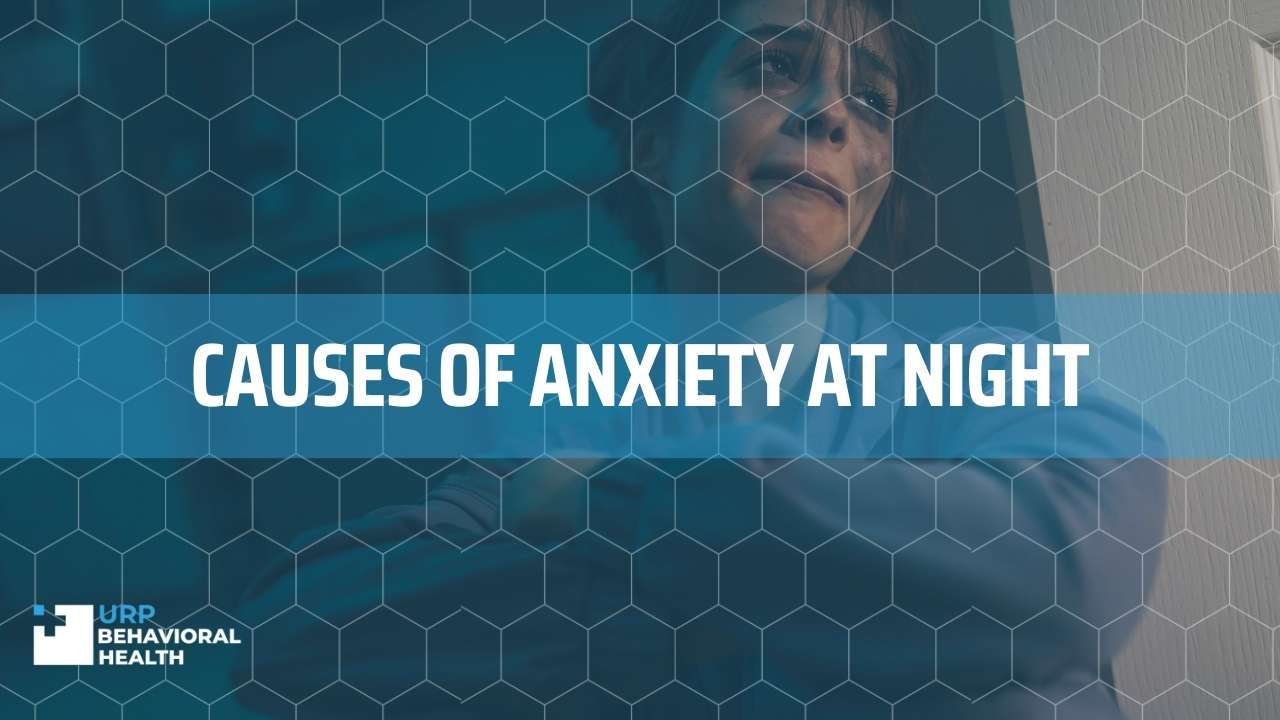
Causes of Anxiety at Night
Why do you get anxiety at night? In most cases, the things making you anxious during the day are the same things making you anxious at night. But why does it feel like you’re extra stressed when bedtime comes around? There could be a few reasons:
Life Stressors
If you’re going through a stressful life event, whether it’s a career change, moving to a new place, or a relationship breakdown, you’re likely to feel more mental distress and anxiety. Similarly, if you’ve experienced a traumatic event like violence or a natural disaster, lying in bed gives you ample time to recall the event and feel anxious.
Fewer Distractions
When you’re in bed, it gives you enough time and space to think about worries you’ve had on the back burner. There are fewer distractions like work or family responsibilities, so you’re more likely to ruminate about other anxieties.
Sleep Anxiety
It’s also possible that you’re experiencing sleep-related anxiety and are worried about not getting enough sleep or being unable to fall asleep. This leads to a continuous cycle in which you’re anxious about not being able to fall asleep, and this anxiety makes it even harder to fall asleep.
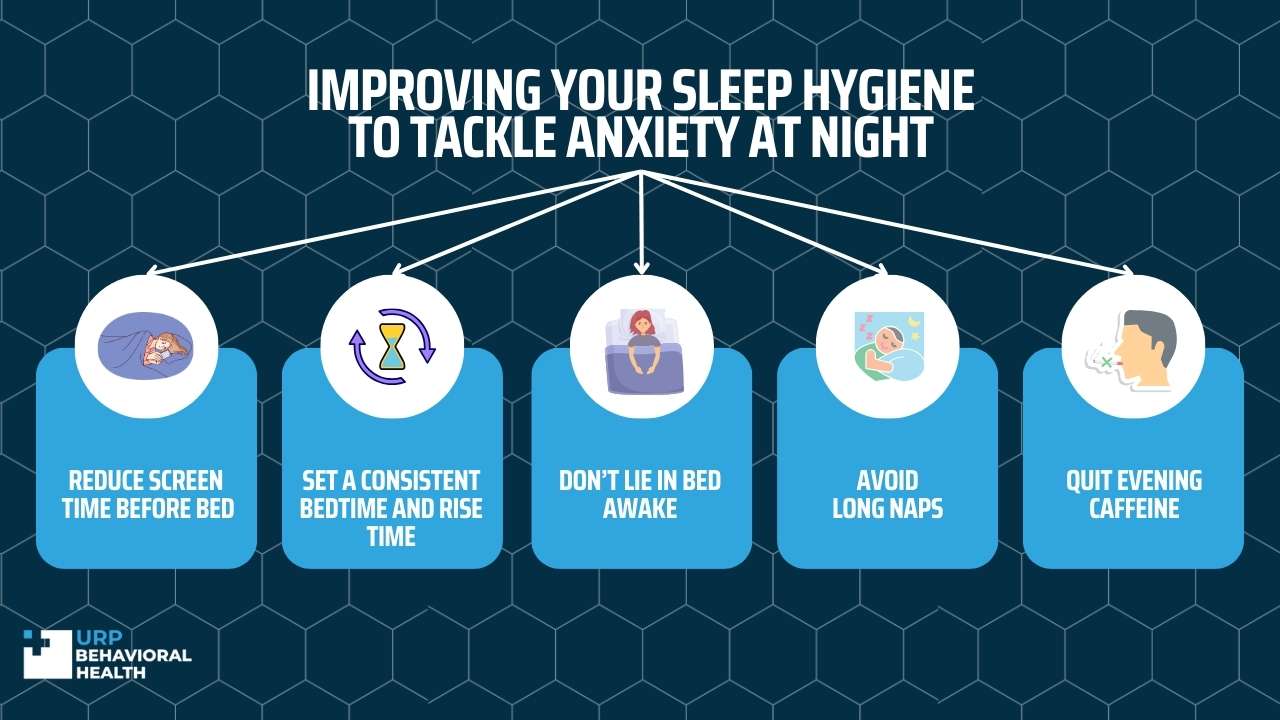
Improving Your Sleep Hygiene to Tackle Anxiety at Night
Though nighttime anxiety can affect a lot of things, it has the most significant effect on your sleep cycle. It’s no secret that having anxious thoughts while you’re in bed doesn’t exactly make for the coziest environment. To help you catch some Zs, you’ll have to work on improving your sleep hygiene. Here are a few things to try:
Reduce Screen time before Bed
Electronic devices like your smartphone, computer, and TV release blue light that messes with your circadian rhythm. It does this by tricking your brain into thinking that it’s daytime, which reduces the release of melatonin and keeps you alert. To avoid any unwelcome interruptions, you should put away screens at least an hour or two before going to bed. If not using your phone for a whole two hours before bedtime sounds impossible, try using a blue light filter.
Set a Consistent Bedtime and Rise Time
Have you ever noticed how you sleep well on days when you are really busy? Keeping yourself busy and working out can help build sleep pressure, making you likely to fall asleep once your head hits the pillow. This leaves little time to get anxious and worried. Sticking to a fixed bedtime and rise time can help build sleep pressure by ensuring that you’re not sleeping more than needed.
Contact our admissions team now to begin your path toward a brighter future.
Don’t Lie in Bed Awake
If it’s been 20 minutes since you lay down and you still can’t go to sleep, it’s time to get up and try engaging in a sleep-inducing activity. When you stay awake in bed, it creates an association between your sleeping environment and wakefulness. So, get up and read a book or write in your journal before going to bed and trying to fall asleep.
Avoid Long Naps
Remember the point about building sleep pressure? Well, taking long naps during the day, especially within six to eight hours of your bedtime, can make it harder to sleep at night. This means you feel tired during the day, take naps to compensate for the lack of sleep, and the cycle continues. If you feel tired during the day, keep your nap short at around 15 minutes so that you’re energized but aren’t compromising on a good night’s rest.
Quit Evening Caffeine
It’s possible that your evening cup of Joe is what’s making you all restless and anxious when you go to bed. Since it’s a stimulant, coffee can make it harder for you to go to sleep. In fact, it can do the opposite and worsen anxiety symptoms like a rapid heartbeat and breath rate.
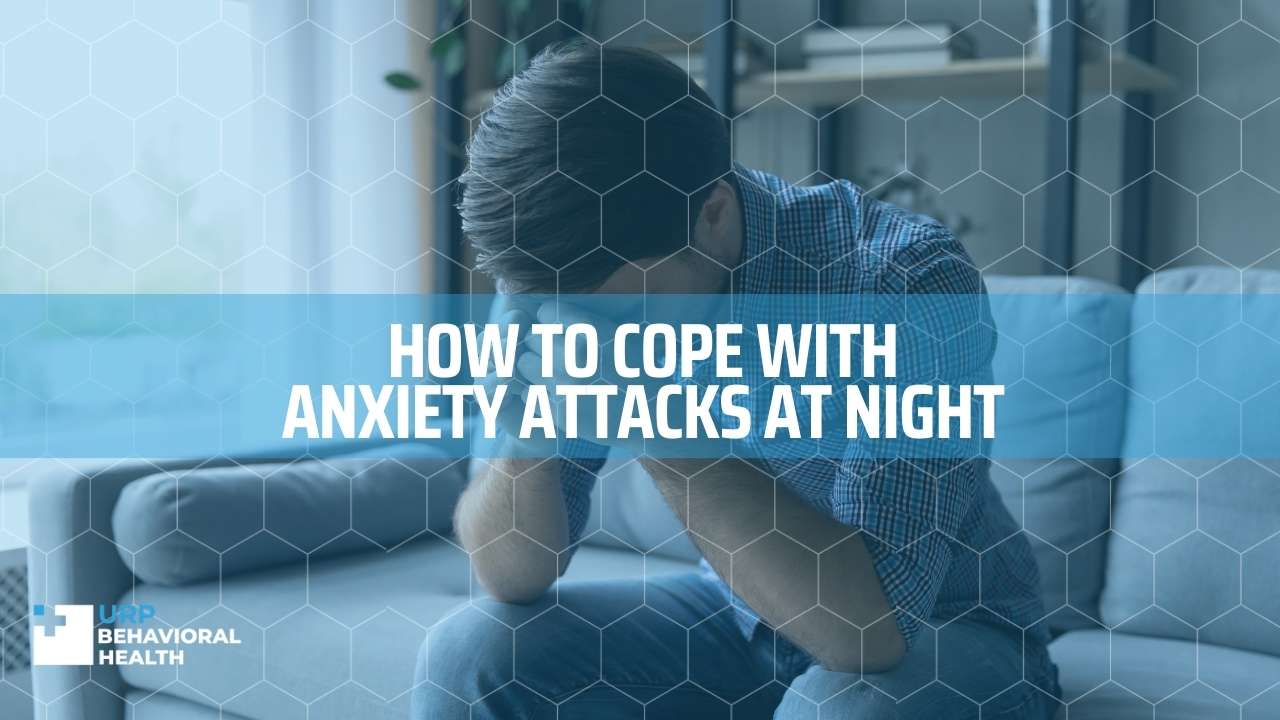
How To Calm Anxiety Attack at Night?
Besides working on your sleep hygiene, there are a few other things you can try to cope with anxiety attacks at night.
Try Meditating
Meditation is a highly effective relaxation technique that calms your body and quiets the mind, and that’s just what you need before going to bed. In fact, research shows that meditation involving deep breathing techniques can help in reducing your anxiety levels near bedtime.
Get Some Exercise
If you’ve been anxious all day, it’s likely that you still have a build-up of stress hormones that keep you from falling asleep. Studies prove that getting daily exercise can help alleviate cortisol levels, increase the release of feel-good neurotransmitters, and allow you to get a good night’s rest. You don’t even have to hit the gym – just a quick brisk walk around the block is good enough.
Take Some Time to Unwind
If you think that you can just come home after a stressful day, lie in bed, and fall asleep, think again. Your mind and body need some time to unwind, so you’re in the mood to sleep. You can do this by creating the perfect environment to encourage sleep. This can include taking a warm bath and dimming the lights.

Treatment Options for Anxiety at Night
Though the above-mentioned activities are certainly effective, you’ll also need to work on the cause of your sleeping difficulties – your anxiety. Relaxation strategies like deep breathing and meditation certainly help, but it’s worth consulting a mental health practitioner as well. Possible treatment options for anxiety at night include:
Psychotherapy
When you present to a mental health practitioner with anxiety, the first recommendation is to take psychotherapy. One of the most common approaches used in this regard is cognitive behavioral therapy, which has proven to be highly effective in addressing different forms of anxiety at night. The primary goal of this approach is to become aware of the negative thoughts causing your anxiety at night and restructure them.
Medication
If your anxiety at night doesn’t respond to psychotherapy alone, then your mental health practitioner may consider prescribing medication to alleviate your symptoms. This can help stabilize your emotional state, making you more responsive to therapy. Plus, it’ll also curb anxiety levels so you get better sleep and feel well-rested. The most common medications prescribed include antidepressants such as SSRIs, or anti-anxiety drugs such as benzodiazepines.
Inpatient Treatment
If you still experience heightened anxiety at night, you can consider enrolling in an inpatient treatment program that targets anxiety disorders. During the treatment program, you’ll be staying at a specialized facility where you undergo evidence-based treatments, as well as holistic therapies, as part of an integrative approach.
The facility is designed to reduce your exposure to anxiety triggers while promoting a focus on overall wellness through balanced nutrition and fitness amenities. Not to mention, you’ll get the chance to build a relaxing sleeping routine that you can mimic at home after the program.
Reach out today and let us create a treatment plan designed around your needs.
Conclusion
Overall, anxiety at night can make it difficult to fall asleep, perpetuating a cycle of sleep deprivation and anxiety that makes you more and more tired. Anxiety at night could be sleep-related, or it can occur because of stressful life events or traumatic experiences. Symptoms include rapid heart rate, shallow breathing, rumination, and even panic attacks. It’s recommended to improve your sleep hygiene by creating a comfortable sleeping environment and trying management techniques like meditation. Lastly, it’s recommended to seek professional help for your anxiety disorder so you experience lower levels of anxiety at night.
















